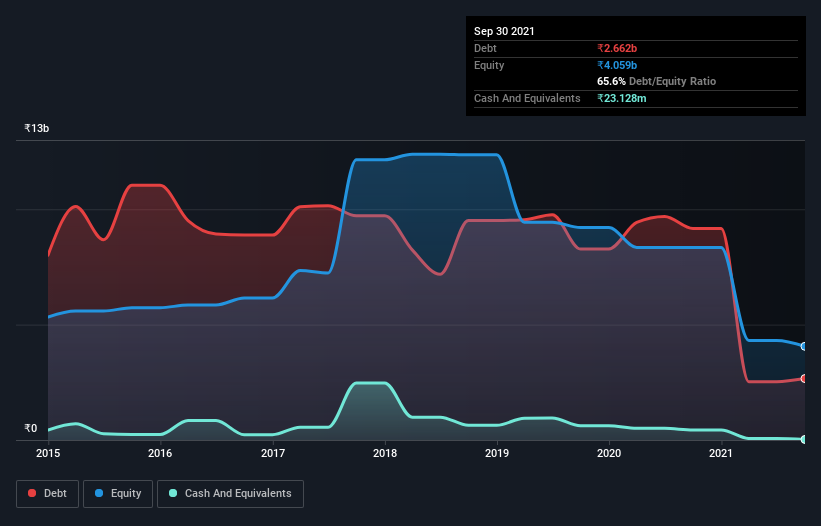The external fund manager backed by Berkshire Hathaway's Charlie Munger, Li Lu, makes no bones about it when he says 'The biggest investment risk is not the volatility of prices, but whether you will suffer a permanent loss of capital.' So it might be obvious that you need to consider debt, when you think about how risky any given stock is, because too much debt can sink a company. We note that Vivimed Labs Limited (NSE:VIVIMEDLAB) does have debt on its balance sheet. But is this debt a concern to shareholders?
Why Does Debt Bring Risk?
Generally speaking, debt only becomes a real problem when a company can't easily pay it off, either by raising capital or with its own cash flow. In the worst case scenario, a company can go bankrupt if it cannot pay its creditors. However, a more common (but still painful) scenario is that it has to raise new equity capital at a low price, thus permanently diluting shareholders. Of course, the upside of debt is that it often represents cheap capital, especially when it replaces dilution in a company with the ability to reinvest at high rates of return. When we examine debt levels, we first consider both cash and debt levels, together.
View our latest analysis for Vivimed Labs
What Is Vivimed Labs's Debt?
The image below, which you can click on for greater detail, shows that Vivimed Labs had debt of ₹2.66b at the end of September 2021, a reduction from ₹9.16b over a year. And it doesn't have much cash, so its net debt is about the same.

A Look At Vivimed Labs' Liabilities
We can see from the most recent balance sheet that Vivimed Labs had liabilities of ₹3.46b falling due within a year, and liabilities of ₹5.22b due beyond that. Offsetting this, it had ₹23.1m in cash and ₹1.85b in receivables that were due within 12 months. So its liabilities total ₹6.81b more than the combination of its cash and short-term receivables.
This deficit casts a shadow over the ₹1.87b company, like a colossus towering over mere mortals. So we definitely think shareholders need to watch this one closely. At the end of the day, Vivimed Labs would probably need a major re-capitalization if its creditors were to demand repayment. When analysing debt levels, the balance sheet is the obvious place to start. But it is Vivimed Labs's earnings that will influence how the balance sheet holds up in the future. So when considering debt, it's definitely worth looking at the earnings trend. Click here for an interactive snapshot.
Over 12 months, Vivimed Labs made a loss at the EBIT level, and saw its revenue drop to ₹4.4b, which is a fall of 55%. To be frank that doesn't bode well.
Caveat Emptor
While Vivimed Labs's falling revenue is about as heartwarming as a wet blanket, arguably its earnings before interest and tax (EBIT) loss is even less appealing. Its EBIT loss was a whopping ₹602m. If you consider the significant liabilities mentioned above, we are extremely wary of this investment. Of course, it may be able to improve its situation with a bit of luck and good execution. But we think that is unlikely since it is low on liquid assets, and made a loss of ₹1.0b in the last year. So we think this stock is quite risky. We'd prefer to pass. The balance sheet is clearly the area to focus on when you are analysing debt. But ultimately, every company can contain risks that exist outside of the balance sheet. Be aware that Vivimed Labs is showing 3 warning signs in our investment analysis , and 1 of those is significant...
When all is said and done, sometimes its easier to focus on companies that don't even need debt. Readers can access a list of growth stocks with zero net debt 100% free, right now.
New: Manage All Your Stock Portfolios in One Place
We've created the ultimate portfolio companion for stock investors, and it's free.
• Connect an unlimited number of Portfolios and see your total in one currency
• Be alerted to new Warning Signs or Risks via email or mobile
• Track the Fair Value of your stocks
Have feedback on this article? Concerned about the content? Get in touch with us directly. Alternatively, email editorial-team (at) simplywallst.com.
This article by Simply Wall St is general in nature. We provide commentary based on historical data and analyst forecasts only using an unbiased methodology and our articles are not intended to be financial advice. It does not constitute a recommendation to buy or sell any stock, and does not take account of your objectives, or your financial situation. We aim to bring you long-term focused analysis driven by fundamental data. Note that our analysis may not factor in the latest price-sensitive company announcements or qualitative material. Simply Wall St has no position in any stocks mentioned.
About NSEI:VIVIMEDLAB
Vivimed Labs
Vivimed Labs Limited, together with its subsidiaries, manufactures and sells active pharmaceutical ingredients (APIs), finished dosage formulations, specialty chemicals, and retail branded formulations in India.
Good value with weak fundamentals.
Similar Companies
Market Insights
Community Narratives




